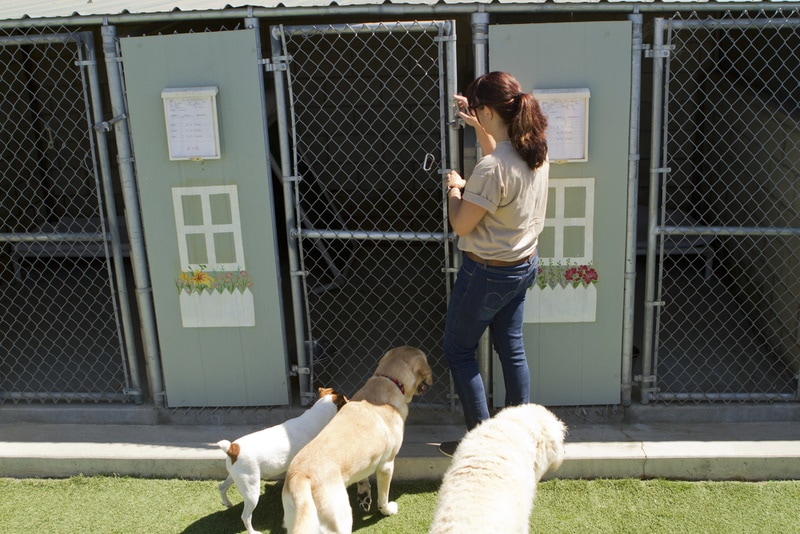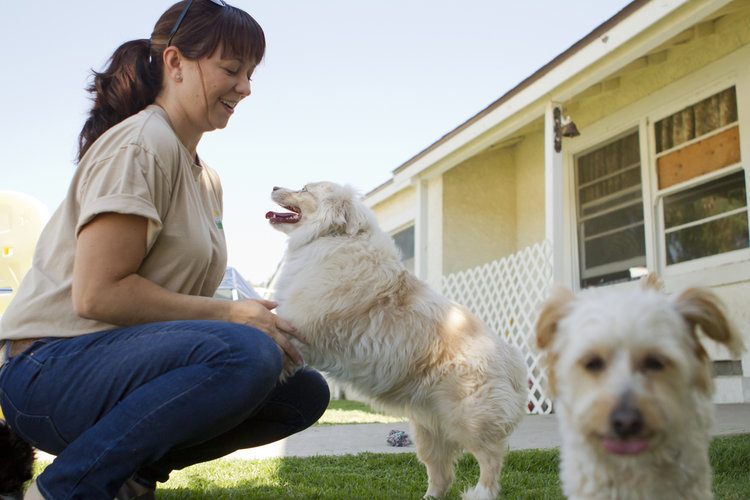10 Benefits of Dog Boarding: Science, Benefits & FAQ

Updated on

Dog boarding is usually different from kennels. In kennels, your dog sleeps in a cage or room that may or may not have access to the outdoors. Dog boarding means that your pup goes to stay with a pet sitter in their own home. They won’t usually be put in a cage or shut away in a room, they may integrate with other animals, and the sitter should treat them as one of their own pets for the duration of the stay. Boarding is most often used when you go on holiday or a work trip but may also be required for the duration of a hospital stay or even when moving house or having work done to a property.
Below are 10 of the benefits of dog boarding, rather than using kennels or a pet sitter that comes to your home.
The 10 Benefits of Dog Boarding
1. Socialization
Most boarding facilities will have multiple dogs and potentially even cats. Those animals may belong to the facility owner or other clients using the service. In any case, having your dog mix with others is an important part of socialization, which itself is an important part of a puppy and young dog’s life, and it remains important even as they age. In kennels, dogs rarely mix with other dogs and tend to spend their stay in their allotted room. If a sitter comes to your home, the only pets they are likely to socialize with are your own.

2. Physical Exercise
All dogs need physical exercise. This can take the form of playing with a ball or other dog toys, but walking is the most common form of dog exercise. Dogs in kennels often do not get daily walks which means they will have a lot of pent-up energy when it is time to collect them. Dog boarding usually provides outdoor exercise and may involve multiple dogs playing outdoors.
3. Mental Stimulation
Dogs get bored when left in a cage or room for days on end. This boredom can lead to problems at the time, such as excessive barking or a need to burn off more energy. It can also cause longer-term problems. Your dog may develop bad habits and you might be the one to suffer when you get home. With boarding, the dog will socialize with other animals and people, which already increases mental stimulation. If the sitter also engages in games and playtime with the dog, it will get all the mental stimulation it requires.
4. Reduce Separation Anxiety
Separation anxiety is stress and anxiety caused when your dog is away from you for long periods. Some dogs are more prone to separation anxiety than others and it can manifest itself in several ways, including destructive behavior. It may be possible, with some dogs, to desensitize them to being left alone, but if you need to leave your dog for days, having a sitter come in to walk them once or twice a day won’t be enough to prevent anxiety. Your dog may still miss you when left at dog boarding, but the presence of people and other animals will help quell the separation anxiety.

5. Avoid Stress
Even if your dog is independent and can handle being left alone, it may still suffer stress and anxiety when left in kennels. This can be caused by the lack of contact, a lack of physical and mental stimulation, or by being confined to a room while listening to other dogs barking. Your dog may still endure some anxiety as they are away from you while boarding, but having company and regular attention will help alleviate most forms of stress.
6. General Pet Care
Dog boarding does cost more than kennels, but this extra cost does offer more general pet care. Your dog gets physical and mental exercise. You can also dictate the food and amount of food that is given, although you may be required to provide the food yourself. And because the sitter will be spending regular time with your dog, they will be able to quickly recognize if anything is wrong with your dog.
7. Medication Administration
Another way that dog boarding can help with care for your dog is in the administration of medication and supplements. Whether you give your dog regular joint care supplements, or it needs medication for liver problems, you mustn’t miss any of the courses being given. A sitter will be experienced in giving medication, even to some of the more challenging pets, and they will ensure that your dog gets everything it requires during its stay.

8. Routine
Most dogs thrive on routine. There will be some changes to the routine they face when boarding, but they will have set mealtimes and exercise times. A lack of routine can cause anxiety in some dogs, so this timetable can make the stay more pleasant.
9. Privacy
Rather than using a boarding facility or kennels, another option when leaving your dog for any length of time is to have a sitter come to your house. Some will stay over, others will come and walk the dog, administer medication, and perform other tasks. However, this does mean leaving a key with the sitter and letting them into your house. Not everybody is comfortable letting a pet sitter have free reign over their home.
10. Protect Your Property
If your dog suffers separation anxiety or gets bored while you’re away and they’re waiting for the sitter to come and walk them, they can become destructive or they may get ill. Accidents can also happen, and whether it is a chewed sofa or puddles on the rug, these can cause permanent damage or, at the very least, will need cleaning when you get home. With boarding, you won’t have to worry about coming home to a mess caused by your pup or even the pet sitter.

Do Dogs Enjoy Boarding Kennels?
Every dog is different. Those who don’t get along with other dogs may still find the whole boarding experience to be a stressful time. Others, and especially those who like spending time with their canine kind, may actually enjoy the experience. The key is to get your dog used to boarding, so consider having them stay just one or two days the first time you use the service and see how they get on with the experience.
Is Boarding Stressful for Dogs?
Generally, dogs will find boarding stressful to some extent because they are spending time away from their family and home, and their routine will change slightly. Dogs like routine and they generally dislike being away from their loved ones. Boarding may reduce the amount of stress compared to kennels, but some dogs will still suffer some level of stress.
Conclusion
Dog boarding usually means that your dog will go and stay at a pet sitter’s home. They may be the only dog, or they may be one of several dogs staying, but the dog will not usually be shut in one room and should enjoy regular time outside and with people and other dogs. It can actually provide a good source of socialization and reduces the stress associated with you going away and leaving your dog in kennels.
If your dog is especially nervous or anxious, boarding may be the best option and it can prove beneficial when you go away on holiday or a work trip, if you have to stay in hospital, or even if you are having work done to the house that will cause disruption.
You Might Also Be Interested In:
Featured Image Credit to: Jayme Burrows, Shutterstock













